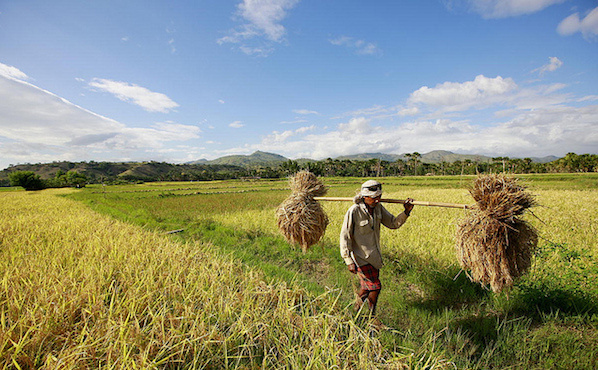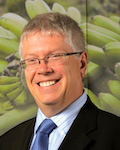
By Dr Dyno (J.D.H.) Keatinge, AIRCA Chair and Director General of AVRDC - The World Vegetable Center, and Dr Trevor Nicholls, AIRCA Steering Committee Member and CEO of CABI
Science may not be the first thing that comes to mind when you think of development but it often forms the foundation of solutions to tackle some of the world's most critical issues, like ensuring people can grow enough food to eat. Today is World Science Day for Peace and Development, an opportunity to show the important contribution that science, knowledge-sharing and technology make to global development, especially to food and nutrition security.
Access to science-based information can make the difference between harvests that flourish or fail. While much agricultural information is readily accessible to farmers in the developed world, it remains out of reach for many others. Knowledge sharing and knowledge transfer are the keys to building the livelihoods of some of the world's poorest smallholder farmers - people who grow food to eat or to sell on a small scale. Surprisingly, mobile technology is fast becoming one of the best ways to reach farmers with this information.
Around 40% of people in the developing world now actively subscribe to mobile services, with 130 million new subscribers every year and mobile 2G coverage available for around 95% of users. This makes delivery of information by mobile phone one of the most effective ways to reach smallholder farmers; a phenomenon that governments and organisations will want to embrace.
Mobile delivery of agro-advisory services, through voice messages for example, can help overcome no or low literacy, as well as language barriers. Innovative provision of these services helps to address the fact that there there are too few trained people who can bring agricultural knowledge directly to the world's farmers.
 Science-based knowledge delivered by phone can address the full range of information needed to help people to feed themselves, all the way from field to fork.
Science-based knowledge delivered by phone can address the full range of information needed to help people to feed themselves, all the way from field to fork.
For example, information on integrated soil health management can help smallholder farmers to increase their crop yields by as much as two - or threefold. Likewise, information about crop and plant health can help farmers reduce substantial losses to plant pests and diseases, as well as help them better handle, store and transport produce. This is important as up to 40% of the world's food is lost in post-harvest production. The knowledge shared must be geared towards helping farmers grow more and lose less.
Sharing of science-based nutritional information is also essential. Malnutrition is the largest single contributor to child mortality worldwide and a hugely important issue that needs tackling urgently. Helping people achieve a well-balanced diet will help address the problem of ‘hidden hunger' due to malnutrition. A diet with sufficient consumption of fruit, legumes, vegetables, and other crops is the obvious key to alleviating this serious health problem.
Mobile services can combine agricultural and nutritional information, helping farmers understand not only what to grow but also how to prepare and cook new produce and get the most out of it nutritionally by combining it with complementary foods. Iron bioavailability, for example, can be at least doubled for teenage girls in south Asia who consume mungbean (a kind of legume) dhal daily if some tomato and a little oil is added in the cooking process. Mobile services can share information about neglected and underutilised crops that, due to their resilience, are able to produce sustainable yields and good nutritional value. They can deliver the right information to the people who need it most, often teenage girls and mothers.
Supporting women is central to supporting food and nutritional security. Again, knowledge-sharing and science can help dramatically. In many parts of the world, growing food for the family, often in small kitchen gardens, is the responsibility of female members of the household. Helping women understand the nutritional value of growing a range of fruit and vegetables can make a big difference to the health of whole families. The challenge is finding the means to get the right information to women, as in some cultures they are not always as easy to reach as men.
Aside from mobile services, face-to-face training schools, where girls and women can receive an education in agricultural skills, are helping to make a difference. Educating girls and young women about agriculture and helping them build careers in farming is important. While young people may believe there is no future in farming, quite the opposite is true. By 2050, global food demand is predicted to grow by 60% from 2005 levels. As such, effective, efficient and sustainable food production is becoming more important than ever before, and nurturing young women's careers in agriculture will be a vital part of addressing this.
Partnership-focused, science-based programmes, like Plantwise, can also help make a significant difference. Plant-wise brings together over 168 partners to support countries in opening plant clinics fielded by plant doctors, who help farmers to diagnose and solve plant health problems, and thereby grow more and lose less of what they produce. With an eye on the role of gender in advisory services, the programme has encouraged more than a 25% uptake by women plant doctors, who, in turn, are reaching greater numbers of women farmers with knowledge to manage pests.
Knowledge sharing - especially the sharing of important scientific knowledge and modern technologies - lies at the heart of successful development. Today is an important day to think about the ways in which we can share knowledge to empower future generations to answer some of the world's most important questions, like how we grow enough food to feed and nourish a fast growing global population.
 |
Dr. Dyno Keatinge is Director General of AVRDC, the World Vegetable Center, based in Taiwan. He is Chair of the Association of International Research and Development Centers for Agriculture (AIRCA), Chair of the Global Horticulture Initiative and is on the Advisory Committee to the USAID Innovation Lab for Horticulture. |
 |
Dr. Trevor Nicholls is the Chief Executive Officer of CABI, a not-for-profit scientific research, publishing and international development organisation. He is a Steering Committee Member of AIRCA, a nine-member alliance focused on increasing global food security by supporting smallholder agriculture within healthy, sustainable and climate-smart landscapes. |